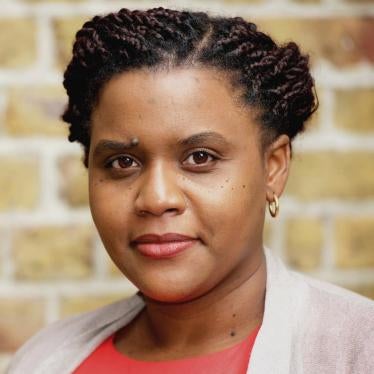DR Congo: M23 Armed Group Forcibly Transferring Civilians
Rwanda as Occupying Force May be Responsible for War Crimes

July 18, 2025
Angolan police used excessive force and carried out arbitrary arrests while dispersing peaceful protesters in Luanda, the capital, on July 12, 2025.

July 9, 2025
Dispatches

July 7, 2025
Commentary

SOUNDBITE: Abena
Freedom means waking up to do what I love without any restrictions, getting the necessary support, and also just feeling very liberated.
VO:
Human Rights Watch has been speaking with people who are locked up simply because they have a mental health condition, to see how their lives have changed since returning home to their communities.
SOUNDBITE: Abena
I love art, I love yoga, I love hiking. You know, I love Africa.
SOUNDBITE: Mimi (a pseudonym)
It is good to be, to be back to the community. My family has been very supportive. Their support is very important, like if you get a supportive family and a supportive community where people don’t stigmatize you or people don't criticize you.
VO:
In Ghana, like in many countries, people with psychosocial disabilities or mental health conditions face stigma on a daily basis. This stigma means people with psychosocial disabilities, are often locked away in “prayer camps” and traditional healing centers where they maybe subjected to shackling and other human rights abuses.
SOUNDBITE: Mimi (a pseudonym)
From what I remember, I was not happy to be there. Being locked up in your room. I don’t remember being shackled but I said I remember when they were taking it [the shackles] off. When they took it off, I would go back into the room and they would lock the door. I would be there in the room alone during the night. I really didn’t like that experience, being alone locked up.
VO:
People with psychosocial disabilities should not be locked up or shackled. Instead, the government should support them to live in the community. Since 2011, Human Rights Watch has been documenting what life is like for people with psychosocial disabilities when locked away, often in chains.
SOUNDBITE: Bernard
I was there for two years [prayer camp.] And during those times to my children were not old at all. So I think of them a lot. So I sometimes cry, bitterly with loud voice, calling them, but this was my situation.
SOUNDBITE: Abena
I have not been shackled, but I've been physically restrained. You know, about four, five strong men holding me down, for me to receive injections that were not necessary.
VO:
Human Rights Watch found that families often take people with real or perceived psychosocial disabilities to faith-based or traditional healers because of the widely held beliefs that such disabilities are caused by curses or evil spirits, and because their communities have limited, if any, mental health services.
SOUNDBITE: Abena
The quality of care has to be improved.
SOUNDBITE: Mimi (a pseudonym)
In our country there’s so many misconceptions about mental health.
SOUNDBITE: Mimi (a pseudonym)
I think education is very important.
SOUNDBITE: Abena
Yeah, I have been ostracized a lot. You know, there were times where I lost employment opportunities. And it affected, like, almost all aspects of my life.
VO:
The Ghanaian government should provide rights-respecting mental health services at the community level and ensure that people with psychosocial disabilities get adequate support for housing, independent living, and job training.
SOUNDBITE: Bernard
Good community means community which is decent. You do things on your own. You can socialize at any place that you want to. And you can attend church. That's what I know is a good community. You have your freedom, you have your peace, you can move about freely.
SOUNDBITE: Mimi (a pseudonym)
I am really happy when I am able to achieve something and I get good results from it. Something I enjoy doing like maybe swimming or cooking something that releases stress or helps me to relax. I also love to see family and friends too, they make me happy.
SOUNDBITE: Mimi (a pseudonym)
In the future I am hoping that the awareness will be created and the stigma will be reduced and people will be much more enlightened about mental health issues and how to offer support especially when the person is going through a crisis.
SOUNDBITE: Abena
People close to me, they are very very supportive, because they understand and they have seen my growth.
SOUNDBITE: Abena
Being independent is a must. It is something that we all have to demand and have. So you can actually, you know, be yourself, live your best life. You know, to the fullest.
END CREDITS

Uganda
"Nsubuga", Farmer
This is where the pipeline will pass.I am very worried because it is so close to my house and I don’t know what will happen.
Narration
All along the route of the planned East African Crude Oil Pipeline (EACOP), the echoes of communities voicing the same concerns. If built, the 1,443 kilometer pipeline would link the Tilenga and Kingfisher oil fields in western Uganda to the Tanzanian coast.
Diana Nabiruma, Africa Institute of Energy Governance
There is a lot of resistance against the EACOP because the Tilenga, Kingfisher, and EACOP oil projects are bad for people, are bad for nature, and are bad for climate change.
Maxwell Atuhura, Environmental Activist
I object the pipeline because it has displaced thousands and thousands of people without enabling them to regain their land elsewhere.
Narration
TotalEnergies and the Chinese company CNOOC acquired the rights to develop
the oil fields along with Ugandan and Tanzanian companies. Uganda has considerable renewable energy potential. It doesn’t need the pipeline.
"Nsubuga", Farmer
There were trees all over here but they were cut and the government isn’t saying
anything about this.
Narration
Like some 90% of farmers, Nsubuga accepted money in exchange for a plot of his land,but he described a process that was lengthy and confusing and many promises, including some assistance with the school fees, unkept.
"Nsubuga", Farmer
Over the years, the same coffee plants our grandparents had farmed helped pay the children school fees throughout the school year,but now this is not the case anymore and the children’s school fees are always going up.
Narration
Problems around the relocation of the families’ graves, caused more resentment towards
TotalEnergies.The compensation offered at the time wasn’t always enough for the
traditional rituals to be conducted.
Not far from here, Lubega is one of the few farmers who refused compensation
from TotalEnergies.
"Lubega", Farmer
The first time they came they told us that a mature coffee tree will be valued at 33,000 Ugandan shillings (US$9). We told them that it takes a lot of time to grow coffee until it’s this big.You have to dig the pit, buy the seedlings, plant the coffee, so their valuation was unfair.
That’s why I first refused to sign the contract. I don’t think the forms they brought were clear.
I didn’t notice certain words, couldn’t read them. A lot was not clear.
Narration
TotalEnergies promised farmers would not be worse off but those leaving their land have not
been fairly compensated. The money received didn’t allow them to purchase land as fertile or as big in the same area. 100,000 people across Uganda and Tanzania will lose their land and livelihoods.
Maxwell Atuhura, Environmental Activist
People were dependent on their land for survival, schooling their children, medication and all sorts of income in their home. They lost it. And it was long-term, the families
grew up being supported by that land. But one project is coming and
taking it in just a few hours!
Narration
In a response to Human Rights Watch reporting about inadequate compensation, TotalEnergies said they continue to pay close attentionto respecting the rights of communities concerned
and added they believe the compensation paid met the standard of full replacement value.
"Lubega", Farmer
Once the pipeline starts working, I don’t know if I will still be able to grow
stuff like beans or coffee. I fear it will never be the same. Those who resist and those
who defend them, risk arrest and continuous threats from the Ugandan authorities.
Diana Nabiruma, Africa Institute of Energy Governance
If you’re campaigning to stop the expansion of the fossil fuel industry, it is very difficult.
More so if you’re working in a country such as Uganda where the civic space is repressed.
Now when they realize that arrest can't stop you, then intimidation, threats,
delegitimization,and other types of activities that aim at stopping the work that we do
are perpetrated against us.
Maxwell Atuhura, Environmental Activist
The method of continuing has been silencing those who want to talk. They [Ugandan authorities] create fear to talk about these dangers to see that nobody else should
talk about it.
Narration
Jealousy, a farmer and a pastor from the northern part of the country, decided to take the fight against EACOP and TotalEnergies to France.
Jealousy, pastor and farmer
Then when I was coming back to my motherland Uganda, I reached at Entebbe airport,
I was arrested, detained in jail for nine hours. And after I came back, I got
intimidation calls from different people. They called me, I didn't know them,
saying you’re sabotaging government,you’re sabotaging the oil project.
Narration
And while the farmers wonder what the futureholds for them, activists hope international
financial backers will steer clear of supporting EACOP.
Diana Nabiruma, Africa Institute of Energy Governance
We would also like to see the international community ensuring that investments or money is flowing into the green economic sectors. It's not enough for them to take away funding from the fossil fuel sector. They must ensure that the funding that has been going to that sector flows to renewable energy and other green economic sectors so that Ugandans and people elsewhere, can prosper while conserving nature.
We can’t name the Ugandan filmmakers for security reasons. We would like to thank them and all the contributors who spoke with us.

Rwanda as Occupying Force May be Responsible for War Crimes
How Uganda’s Anti-LGBT Climate Unleashes Abuse
Hold Abusers Accountable in Fair Credible Trials
51st session of the United Nations Universal Periodic Review
Authorities Should Release Moussa Tiangari, Stop Harassing Civil Society
Drop Politically Motivated Charges, End Crackdown
Geneva Renews Special Rapporteur Mandate
June 25 Explosion Killed, Injured Students; Inquiry Needed
48th session of the United Nations Universal Periodic Review
Abductions, School Attacks, Rapes Should Spur Action
HRW Oral Statement - Universal Periodic Review Outcome Adoption - HRC59
Investigate Violence, Ensure Freedom of Assembly Ahead of September Elections
Authorities Should Also End Media Ban, Protect Rights to Assemble and Protest











Power of the Streets is a podcast about how we speak truth to power. In a series of intimate interviews, host Audrey Kawire Wabwire brings us the achievements and stories of the young people driving Africa’s human rights movement.
Listen NowGet updates on human rights issues from around the globe. Join our movement today.